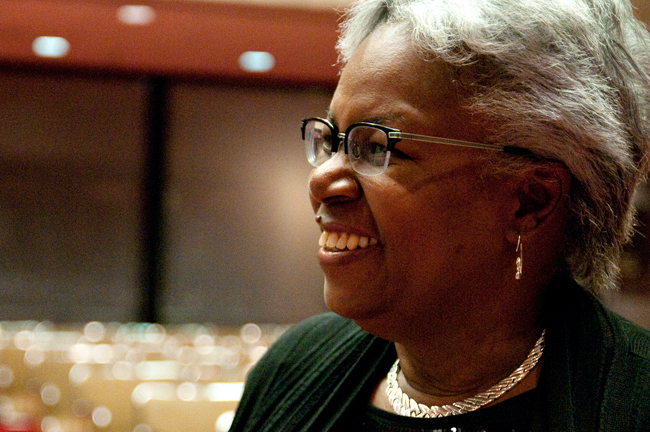Jackie Robinson, the first African-American major league baseball player, was instrumental in bringing an end to segregation in baseball, but also in all of America.
Sharon Robinson, daughter of the late Jackie Robinson and Branch Rickey III, grandson of the late Branch Rickey Senior, Robinson’s major league recruiter, spoke yesterday at the Lyndon B. Johnson Library about the role baseball played in society and politics through the cultural legacies of Robinson and Rickey. Sports Illustrated senior editor Kostya Kennedy moderated the discussion.
“Rickey and [my father] came together 65 years ago and started a partnership that was built on incredible trust within a racially-divided United States,” Robinson said.
At that time, baseball was segregated, and African–Americans and whites played in separate leagues, she said. Robinson began playing in the African-American leagues, but was soon chosen by Branch Rickey, a vice president with the Brooklyn Dodgers, to help integrate major league baseball, she said.
Robinson joined the all–white Montreal Royals, a farm team for the Brooklyn Dodgers, in 1945. Robinson moved to Florida in 1946 to begin spring training with the Royals, and played his first game on March 17 of that same year, Ricky said.
Robinson said her father made a commitment to play in what was then deemed the “baseball experiment.” Despite continuous racial abuse, Robinson did not fight back and soon made proved his worth on the baseball field, she said.
Texas Program of Sports and Media director, Michael Cramer, said this critical event was at the brink of the modern American Civil Rights Movement.
“This was a rare opportunity to have two witnesses of history talk about their experiences first hand,” he said. “It intrigued me because we don’t see the world like they did in 1947. These are events that happened in our grandparents’ lifetime.”
Jackie Robinson was the first African-American athlete who used his celebrity and accomplishments to branch into other aspects of the Civil Rights movement, his daughter said. Robinson is noted for his achievements within the National Association for the Advancement of Colored People and his continued voice in social activism.
Robinson said being an athlete did not facilitate her father’s involvement in social activism. Instead, his natural instinct was to become a champion of civil rights, she said.
In order to bridge the social championing of Jackie Robinson to future generations, the Jackie Robinson Foundation was established in 1973 to promote the educational advancement of underrepresented populations. A total of 1,500 students have benefited from the foundation’s services, with a 97 percent graduation rate of scholarship students.
“Education has become such an embedded part of the Jackie Robinson legacy,” Rikey said. “These kids know they are Jackie Robinson scholars and won’t be let down.”
Symbolic of all his achievements, Robinson was placed as the No. 2 most admired man alive in a 1947 Life magazine, Rickey said. Robinson’s success on and off the field ultimately captured the attention of not only black America, but also white America, he said.
Public relations sophomore Meg Weiss heard about the forum in her Sports, Media and the Integration of American Society class and said she subsequently decided to attend.
“Attending this lecture was a privilege and it brought me to the realization that this major event in history happened so recently,” Weiss said. “I felt more of a connection to the story as opposed to reading a textbook, because this historical event is so prevalent.”





















